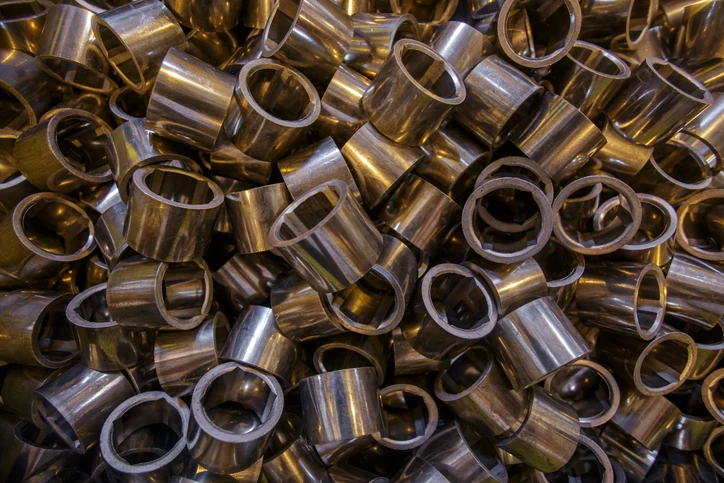
Mechanical Properties of Powder Metal Components
It’s no secret that material selection plays an important role in component manufacturing, regardless of your chosen manufacturing method. Specific to powder metallurgy, a wide range of materials and different controls within the process are available to achieve the desired mechanical properties of components.
Here, we explore the mechanical properties of powder metal components, showing how pm technology can be a game-changer for multiple applications.
What is Powder Metallurgy?
Powder metallurgy is a metal-forming process involving the compaction of metal powders into a desired shape and then heating the compressed shape to bond the particles. This technology offers many advantages, including material conservation, precise control over the final product's properties, and the ability to produce parts with complex geometries and dimensional tolerances that would be challenging or impossible to achieve through competing manufacturing methods.
Key Mechanical Properties of Powder Metal Components
When evaluating materials for any application, understanding their mechanical properties is crucial, as these characteristics dictate how the material will perform under different types of loads and conditions. Whenever we select a material, it is tailored to the application. For powder metal components, several key mechanical properties should be considered, including:
-
Tensile Strength:
This measures the maximum tensile stress a material can withstand before failure. Powder metal components can be engineered to have high tensile strength, making them suitable for applications where resistance to pulling apart is critical.
-
Fatigue Strength:
Fatigue strength refers to a material's ability to withstand repeated loading and unloading cycles without failing. PM components exhibit excellent fatigue strength, essential for parts subjected to cyclic stresses, such as gears and bearings. -
Impact Resistance:
The ability of a material to absorb energy during a collision and not break is known as impact resistance. Through careful selection of powder materials and processing conditions, PM components can achieve high levels of impact resistance. -
Corrosion Resistance:
This property indicates how well a material can withstand damage caused by oxidization or other chemical reactions. Powder metallurgy allows you to incorporate corrosion-resistant alloys into the component, enhancing its longevity in harsh environments. -
Yield Strength:
Yield strength is the amount of stress at which a material begins to deform plastically. Depending on the application requirements, PM components can be tailored to have specific yield strengths, ensuring they perform well under predetermined loads. -
Ductility:
Ductility measures a material's ability to deform under tensile stress. It is an important property for components that need to bend or stretch without breaking. The porosity of powder metal components can be controlled to adjust their ductility, offering flexibility in design and application. -
Hardness:
Hardness determines a material's resistance to deformation or scratching. Powder metallurgy can produce components with a range of hardness levels, making them suitable for applications where wear resistance is critical.
Tailoring Powder Metal Mechanical Properties for Industry-Specific Benefits
The versatility of powder metallurgy extends across many industries and types of products, each with its unique challenges and requirements. By understanding and harnessing the specific mechanical properties of powder metal components, it's possible to create tailored solutions that not only meet but often exceed the expectations of competing manufacturing methods. Let's explore how the distinctive mechanical properties of PM components can benefit different sectors:
Automotive Industry
In the automotive sector, the demand for lightweight, strong, and durable components is ever-present. Powder metal parts, with their high tensile strength, offer significant advantages. Components like gears, bearings, and sprockets made through PM can withstand the repetitive stresses and strains of automotive use. Moreover, the ability to customize the alloy compositions for enhanced corrosion resistance means longer-lasting parts even in harsh environments, contributing to vehicle longevity and reliability.
Aerospace and Defense
The aerospace and defense industries require materials that can survive extreme conditions, including high temperatures. The customizable alloys for PM components make them ideal for critical applications in these sectors. Components can be engineered to withstand high temperatures, crucial for safety and durability in aerospace structures. Additionally, the corrosion resistance of these alloys ensures they can withstand the challenging conditions of space or battlefield environments.
Medical Devices
In the realm of medical devices, biocompatibility, along with mechanical reliability, is paramount. Powder metallurgy allows for the production of components with specific mechanical properties, such as tight tolerances and corrosion resistance, essential for surgical instruments, implants, and other medical devices. The process's ability to use a wide range of materials, including biocompatible alloys, combined with the precision in achieving desired mechanical properties, makes PM an invaluable technology in medical manufacturing.
Energy Sector
For the energy sector, especially in areas like wind turbines or drilling equipment, materials must endure variable and extreme conditions. The fatigue strength of powder metal components ensures they can withstand the cyclic loads experienced by wind turbine blades or drilling equipment without failure. Additionally, the high corrosion resistance minimizes maintenance needs and prolongs the lifespan of these components, crucial for the cost-effectiveness and sustainability of energy operations.
Electronics and Electrical Engineering
The electronics industry benefits from the precision and versatility of PM in creating components with specific electrical and mechanical properties. The ability to engineer powder metal parts with precise dimensional control is crucial for connectors, switches, and other components that require exact tolerances and reliable performance. Furthermore, the process's efficiency and material conservation make it a sustainable choice for the rapidly evolving electronics sector.
Engineering the Future with Precision-Tailored PM Solutions
The world of powder metallurgy offers a fascinating glimpse into the future of manufacturing, where the mechanical properties of materials are not just found but finely tuned to meet the exact needs of each application. Whether it's the strength, durability, or resistance required, powder metal components stand ready to deliver performance that can transform industries.
If you’re interested in learning more about how powder metallurgy can help your bottom line, reach out to one of our PM experts today!

